FROM THE VAULTS Thoughts On Elvis Presley, On The Occasion Of His 88th Birthday
In honor of his *89th(!!)* birthday, last year's meditation on The Hillbilly Cat, restacked. But there’s always a lot to unpack, when it comes to the King Of Rock ‘n’ Roll.
The Hillbilly Cat mid-thrust, 1956.
It took a couple of weeks for me to post this last year. Considering I still like and stand by what I wrote last year, I shall repost this to honor my gateway drug into literally everything, Elvis himselvis. No further introduction necessary.
January 8th is the anniversary of a few things near and dear to me, and many others. David Bowie’s birthdate, for one. There’s also the Sex Pistols’ appearance at Randy’s Rodeo in San Antonio, possibly the one date on their fatal US tour where they truly got to be the Sex Pistols. But most important, at least in my mind, it’s Elvis Presley’s birthday.
Elvis Presley, 88 years old. That’s hard to fathom. In my mind, he’s forever 21, having sex with his guitar on TV, scandalizing the gray flannel American ‘50s. For some, he’s forever 35, in a white jumpsuit in Vegas with a huge orchestra and two vocal groups surrounding a crackerjack rhythm section, doing epic ballads and being a hunka-hunka burnin’ love. For some, he’s a joke, a figure of scorn, undeserving of the hold he continues to have on the popular imagination, because they heard he was a racist and he ripped off black culture, and he groomed Priscilla, and any other excuse they can find to hate what was, whether you like it or not, one of the 20th century’s definitive artists.
Lord, I get tired of having to defend Elvis Presley. And maybe I don’t have to – pick your battles and all that. But it certainly feels like I have to. And I shouldn’t. I should be free to celebrate The Hillbilly Cat. But there’s always someone out there who feels like they have to tell you what to do, what to like. Perhaps some think that’s what I do. Nah, man. I just write. And it’s all my opinion at the end of the day. And my opinion is that there was a lot more to Elvis Presley than some of you want to admit.
Something happened the moment 19 year old Elvis had exhausted his repertoire of ballads and pop songs in the tracking room at Sam Phillips’ joint at 706 Union Street in Memphis, Tennessee that hot July day in 1954. Something seismic that forever altered American and global popular music. This hillbilly cracker spent time in Tupelo, Mississippi’s Shake Rag neighborhood and Memphis’ Beale Street, who dressed like a black pimp and bought all the rhythm & blues Dewey Phillips and Rufus Thomas could hurl at him on the Memphis airwaves. Now he reached deep into his soul and pulled out an Arthur “Bigboy” Crudup blues number, “That’s All Right.” He, guitarist Scotty Moore and bassist Bill Black attached a rocket engine to it, and got reeeeal, reeeeal GONE, for a change. Two nights later, he did the same thing to a Bill Monroe bluegrass weeper, “Blue Moon Of Kentucky.”
Waylon Jennings sang twenty years later, “Are You Sure Hank Done It This Way?” He was talking about the genre-fucking he and Willie Nelson were doing to country music. No, Hank didn’t do it like that. And neither Crudup nor Monroe did it like Presley, for that matter.
This is the story of American music, American culture in general. A nation built upon immigration takes a look at what other immigrants bring to their new land, and they try it on for size. And they like the results, and suddenly you’re mixing and matching all over the joint. Science calls it genetic engineering. In food circles, this is fusion cuisine. There’s something to be said for this approach. And that something is not the theory of “cultural assimilation.” If this is true, eating Mexican or Italian food is a crime.
There’s also something to be said for the idea of synchronicity. Roughly at that same moment that Elvis was finding his voice in Sam Phillips’ echo chamber, Chuck Berry was hearing something in Hank Williams records that he’d bring to his own take on rhythm & blues. Tell me “Maybelline,” based on Bob Wills’ “Ida Red,” isn’t a rockabilly record! Then there’s the Pennsylvanian Western Swing performer Bill Haley applying his small combo country sound to rhythm & blues.
No, Elvis didn’t invent rock ‘n’ roll. That was an invention by committee. Yeah, the idea was in the air. But Elvis, Scotty and Bill had the most powerful take on it.
Alfred Wertheimer’s skilled lens captures Scotty Moore at the eye of a hurricane named Elvis Presley and hanging on for dear life, at Memphis’ Russwood Park, July 4, 1956.
They went from strength to strength with each subsequent release, getting harder, raunchier, even MORE reeeeal, reeeeal GONE. You hear the boy becoming a man, gaining in confidence, asserting himself to a world that wanted to deny him. “Now listen and I'll tell you baby/What I'm talking about/Come on back to me, little girl/So we can play some house,” he demanded on what may have been the apex of his Sun Records recordings, “Baby, Let’s Play House.” No way the teenager who shuffled into the Memphis Recording Service to cut a record for his mama two years before would have been bold enough to deliver that line credibly, despite asserting to Marion Keisker he didn’t “sing like nobody.” But was he warning himself of his future when he adlibbed in the previous verse? “You may have a pink cadillac/But don’tcha be nobody’s fool.”
Having left the safety of Sun with the eerie, propulsive “Mystery Train” for the uncharted shores of RCA, he expanded beyond the rockabilly he basically invented at Sun. He gave his new bosses a smoldering, desolate torch song, “Heartbreak Hotel,” as the Nashville engineers struggled to replicate Sam Phillips’ tape echo. It became his first of what would be a string of many Number One hits. He still had some rockabilly in him – witness his remake of “Blue Suede Shoes,” or his second Crudup revamp, “My Baby Left Me,” propelled by DJ Fontana’s strip-joint-bred tubthumping, all the echo provided by Scotty Moore’s Ray Butts amplifier.
In some ways, he got more r&b-based – witness his loose Little Richard covers, far greasier and funkier than Pat Boone’s milktoast readings of many of the same songs, or his airy Otis Blackwell renditions, “All Shook Up” and the superb “Don’t Be Cruel.” You can hear Clyde McPhatter and Roy Hamilton influencing his phrasing. In some ways, he added a pop sheen to even his hardest r’n’r, thanks to the presence of the co-billed Jordanaires, and the addition of honky tonk-rockin’ piano.
Elvis and B.B. King backstage at the WDIA Goodwill Revue, Ellis Auditorium, Memphis, Dec. 7, 1956. Racist, my atherosclerotic white ass!
But when Elvis rocked, he rocked. Doesn’t “Hound Dog” put you in mind of the Ramones 25 years early, with Scotty’s metallic power chords and DJ’s machine gun snare punctuations? Isn’t “Jailhouse Rock” the hardest boogie you’ve heard? Don’t you feel your lip curling and your leg twitching when they come on? Sheer attitude. Perfect punk rock, a quarter of a century premature….
Speaking of “Hound Dog,” CAN WE PLEASE STOP THE SILLY BULLSHIT ABOUT ELVIS “STEALING” THE SONG FROM BIG MAMA THORNTON?! Yes, she recorded the first commercially released version of “Hound Dog.” But she didn’t write it anymore than Elvis did. It was written by Jerry Leiber and Mike Stoller, two white teens from NYC who were the most successful rhythm & blues songwriters of the day. The song was up for grabs, to be performed by anyone out there with a microphone and reel of tape. If we are gonna follow this insane logic, Big Mama and Elvis both stole the damned song from Leiber & Stoller! That ain’t the case, is it?
How about the slinky r&b he made of Hank Snow’s “(Now And Then There’s) A Fool Such As I?” This is my favorite of his ‘50s recordings. Snow’s original was downright mordant. Elvis applies a lusty croon to those maudlin words. He infuses so much emotion into that lyric, even as he can’t help but throw a pelvic thrust into ‘em. His version is jaunty, it swings. This isn’t Elvis kissing you goodbye. It’s him delivering a goodbye fuck. And he’s walking away, making you miss him.
He got more subtle and sophisticated as the ‘60s unfolded, across the non-soundtrack work the Colonel’s contracts allowed him less and less. Scotty and DJ were augmented with some top-grade Nashville cats – Floyd Cramer on piano, Hank Garland on most of the lead guitar, Bob Moore on electric bass, Boots Randolph on saxophone. He now expanded to operatic productions like “It’s Now Or Never,” and frequently sang in a lighter timbre than he did as the savage young rocker. The uptempo r&b numbers frequently had a Ray Price shuffle feel, continuing his blurring of the lines between country and blues. When he opted to rock, as on “Little Sister,” no one could approach him still. But isn’t it interesting that some of his most hard rockin’ material was on his gospel records? Something about the heightened emotionalism of belief that drives the most soulful records.
But as the movies were cranked out on a conveyor belt, the soundtracks outweighed his other output. And the staff songwriters the Colonel hired churned out increasingly substandard material. To coin a phrase, these songs were not fit for The King. When he was inspired and in charge of his own music, the artistry shone through. It was easy to forget, hearing “(There’s) No Room To Rhumba In A Sports Car,” that Elvis Presley was one of rock ‘n’ roll’s first self-produced artists in all but title. Guys like Steve Sholes were the names on the credits. But Elvis ran the sessions, choosing the songs from a pile of demos (since he did not write his own songs), working out the arrangements with Scotty, Bill, DJ and The Jordanaires, driving everyone hard until he felt they got it right. He demanded 32 takes of “Hound Dog,” frustrating Scotty to the point where his guitar playing got more aggressive as the night went on. Eventually, Take 28 sounded the best to Elvis.
Now put yourself in Elvis’ now well-scuffed blue suede shoes: Wouldn’t you start to phone it in, after years of “Do The Clam” and “Yoga Is As Yoga Does”? And now, come 1968, the Colonel is demanding his first TV appearance in eight years consist of The Boy singing 25 Christmas songs in a white suit, and saying “Merry Christmas, everyone” at the end of the night?
Truth be told, Elvis began rebelling early in 1967. He regrew his sideburns, gone since his Army service, and began slicking his hair back and piling atop his head in a modern update of his 1956/57 tonsorial glory. He’d just done a non-soundtrack Nashville session featuring a beefier rhythm section sound than he’d enjoyed in years, with ex-rockabilly Jerry Reed on guitar. The material was funkier, simultaneously bluesier (Jimmy Reed’s “Big Boss Man” in an uptown r&b arrangement) and more countrified (Reed’s own “Guitar Man” and “U.S. Male”). He was not about to sing “Here Comes Santa Claus” in a white suit for an hour.
Hound dog, to the manor born: 33 year old Elvis channels a fantasy 21 year old Elvis in black leather, on the ‘68 Comeback Special.
We all know what happened during the ‘68 Comeback Special, as it’s now known: Elvis Presley donned black leather, reconnected with his roots big time, and HOWLED in a raw, animalistic voice he had never displayed, not even in his most savage ‘50s work. Elvis rocked again. He reclaimed his crown.
He seemed determined not to let it go, at first. There was that epic white soul session at American Sound Studio in Memphis, yielding dramatic caucasian r&b and big beat ballads. And what might be his greatest recording, “Suspicious Minds.”
Am I the only one who gets chills and up down the spine as the majesty of that tale of an unraveling relationship builds and builds, in dynamics, in tension? Am I the only one who gets a lump in their throat?
Am I the only one who weeps at what a lost opportunity this was?
“Suspicious Minds” could have been a signpost to a powerful, new, adult Elvis Presley. Singing songs that mattered. Making upbeat, contemporary white soul music, as relevant as anything being produced down the street at Stax. This was a direction that could have sustained his relevance for years to come.
But, hey. Las Vegas happens.
Elvis Presley got bored again. He needed constant challenges to keep producing high quality work. Vegas initially provided that for him. But it became as dull a treadmill as Hollywood.
34 year old Elvis, still offering a fantasy version of 21 year old Elvis onstage at the International Hotel, Las Vegas, 1969.
Colonel Tom Parker built yet another gilded jail cell for his solitary client. Then that client’s heart broke. Elvis never recovered from the end of his marriage. It’s why, when handed a fierce contemporary rocker called “Burning Love,” his heart was not in it. His band managed to coax that classic Elvis who snarled “Hound Dog” and howled through Singer presents Elvis, and got him topping the charts again. But Elvis’ wounded heart was not in rock ‘n’ roll any longer. It was more in “Always On My Mind,” the divorce ballad cut the same session and done to dramatic effect by Willie Nelson ten years later.
He had moments thereafter – rocking the shit outta Chuck Berry’s “Promised Land” at Stax a year later is the major one. It made you wonder why Elvis never cut more Berry or Bo Diddley songs. Or Willie Dixon, for that matter – can you imagine his take on “You Can’t Judge A Book By Its Cover?” Or “Mannish Boy?” Alas, it wasn’t to be. You could lay the blame on Las Vegas, the Colonel, fried peanut butter and banana sandwiches and Dr. Nick’s wonder pills equally for killing Elvis Presley. But I think he died of a broken heart and a broken spirit. He saw no way out. He needed constant challenges to keep vital as an artist. But the Colonel had just built a different gilded prison for his cash cow.
No, an 88-year-old Elvis Presley is impossible to visualize. It’s what happens when you dramatically change the world when you’re 21, all through the simple thrust of one’s hips. That was a revolutionary act. In the mind’s eye, he is forever in the blush of his salad days, hiccuping “Come back behbeh, ah wanna play house wit’choo.” It’s impossible to know if he’d have recognized his rebellious spirit in punk rock, or be heartened by rockabilly’s return a few years later and maybe gotten back with Scotty and DJ to show The Stray Cats how it’s done, or if he’d just grow larger and more indifferent. Songwriters like Bowie and Bruce Springsteen wrote songs for him he never recorded – “Golden Years” and “Fire,” specifically. Roy Wood was contracted around the time he died, to produce a remake of “See My Baby Jive,” as well as to write more strong new rockers for him. All these possibilities are tantalizing, for sure. But whether any of ‘em would have revitalized him is another story – remember, his band had to goad him into cutting “Burning Love.”
Baz Luhrmann’s grandiose biopic from last summer, Elvis, was a great work of cinema, once you accept this was the Colonel’s retelling of his client’s story, from the perspective of a deathbed and a morphine drip. Yeah, the details are gonna get muddled. (And what was up with Tom Hanks portraying the Colonel with a Dutch accent he never had?!) But the key to the entire enterprise was Austin Butler’s performance as The King. That was serious method acting! He embodied the man in ways no one ever has. If he doesn’t get an Oscar, the Academy is well and truly fucked.
But the best thing Luhrman’s picture did for Elvis was depict the man as a serious artist. We see him taking charge of his music and his art, especially once the film transitions to the making of the ‘68 Comeback Special and the first Las Vegas residency. Would that we could have seen more of the Sun sessions, or the “Hound Dog” session, just to fully appreciate how he took charge in the studio. But y’know, wish in one hand….
Ultimately, in rock ‘n’ roll mythology, Elvis Aron Presley was the guy who went to the crossroads under a full moon, the crossroads in this case being Sun Records. We’re still working from the man’s innovations 69 years later. If the planet lasts that long, I’d dare say we shall be working from his innovations 69 centuries hence. Some are gonna scoff, and haters are gonna hate. But Elvis Presley is the square root of everything good and rockin’ in this world, and shall be unto eternity. And he did it via mixing and matching white and black cultures, creating new and exciting ways. Have you heard the news?
#timstegall #timnapalmstegall #timnapalmstegallsubstack #punkjournalism #elvispresley #rocknroll #rockabilly #samphillips #sunrecords #deweyphillips #scottymoore #billblack #djfontana #chuckberry #littlerichard #clydemcphatter #royhamilton #thejordanaires #bigmamathornton #68comeback #memphissessions #lasvegas #coloneltomparker #bodiddley #williedixon #thestraycats #williedixon #davidbowie #brucespringsteen #roywood #bazluhrmann #austinbutler #tomhanks #PunkRock #Punk #Subscribe #FourDollarsMonthly #FortyDollarsAnnually #UpgradeYourFreeSubscription #BestWayToSupport

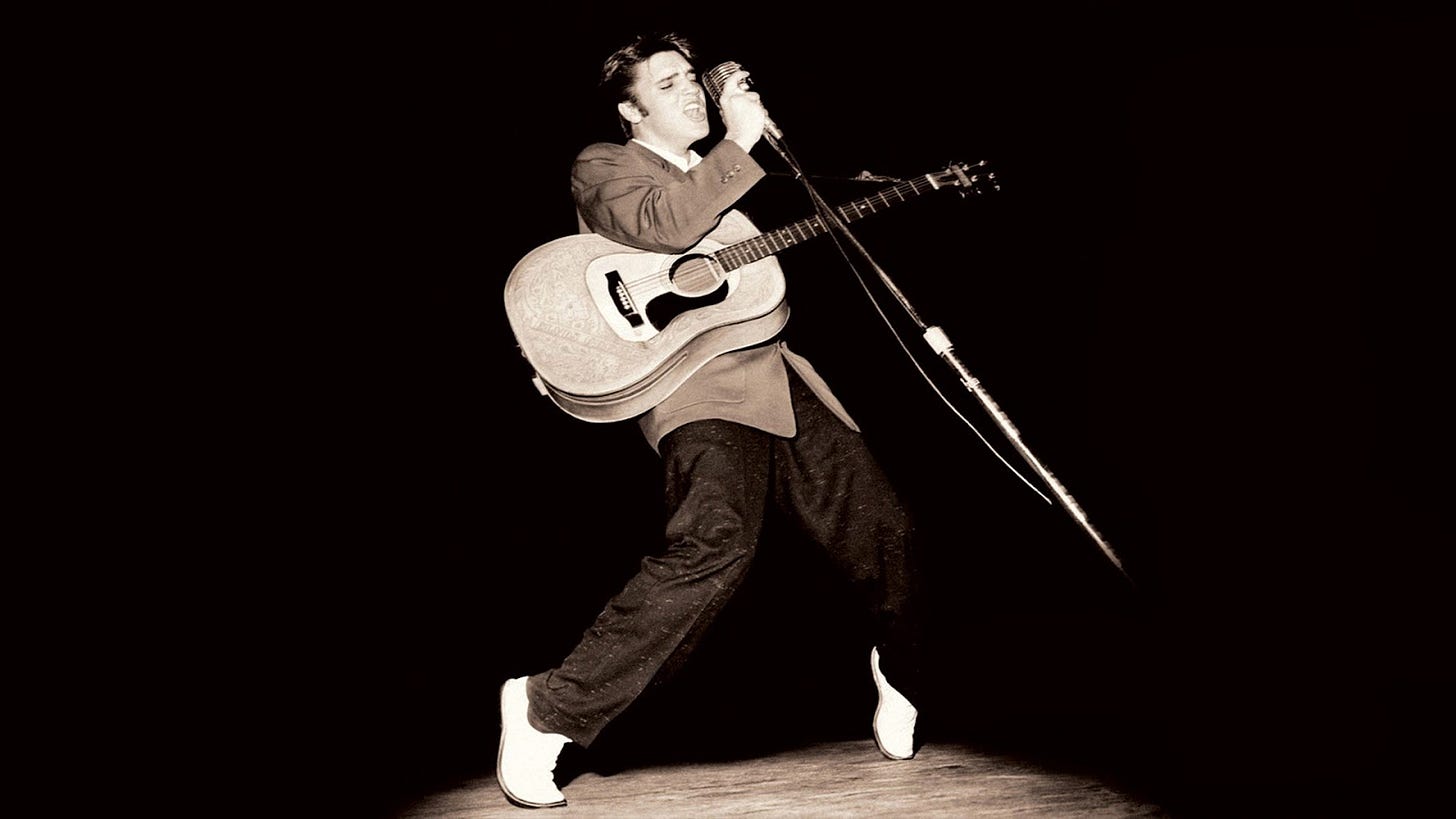
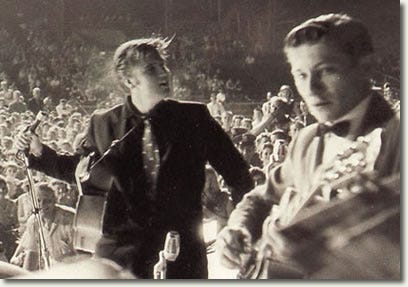
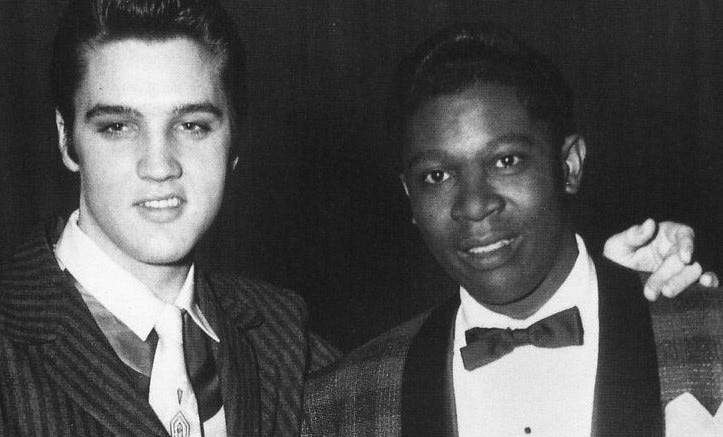
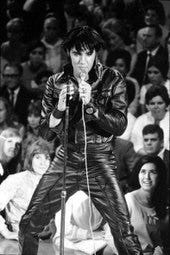
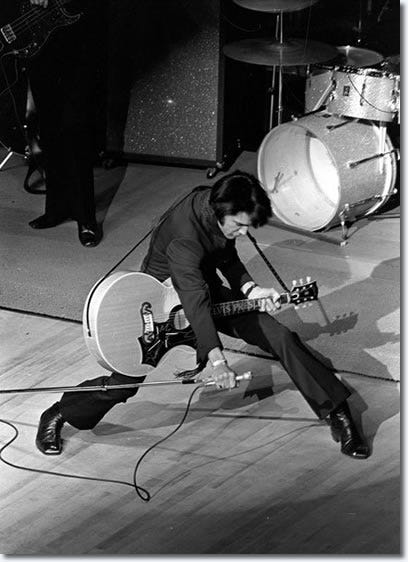
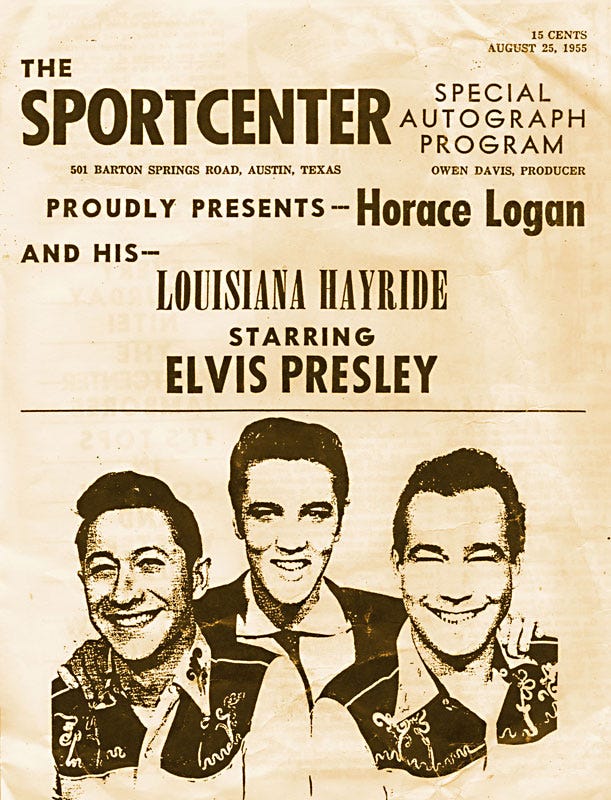
That was terrific!
Excellent article, Tim Stegall. You are an important voice.